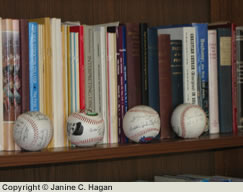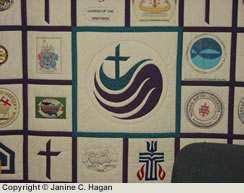Vol 8 Issue 2SectionsPriorities This IssuePrioritiesThoughts on “Food, Family, Friends, and Faith: Celebrating Interview with Dr. Nancy Whitt, Quaker/ Grandmother’s Fruitcake Family>> TransitionsTraditionsChristmas Traditions and Transitions>> Sensory Christmas Traditions>> An Interview with Rabbi Jonathan Miller, Temple Emanu-El>> Wisdom & Wondering
|
ArchiveAn Exclusive Interview with Rev. Dr. Michael Kinnamon, General Secretary of the National Council of Churches I interviewed Dr. Kinnamon years ago when he was at Eden Theological Seminary and had just finished launching the then-new “Churches Uniting in Christ.” Little did he or I know that six years later, we would be having another interview. Only this time the visit takes place in New York City at the office of the National Council of Churches!
Dr. Kinnamon: Thank you, Janine. The ecumenical movement is a movement to help renew the church in the direction of greater wholeness. It is an attempt to live out the gospel claim that we already belong to one another because we commonly belong to Jesus Christ. You and I don’t have to make up our unity, we are given it. If we think that we are the creators of the unity of the church, which is a kind of“works righteousness.” The Good News of the Gospel is that God is active in Christ for the reconciliation of the world. And in breaking down the dividing walls between those who follow Christ, God has created a community which is to be a sign of God’s intention for the entire world, even as fragmented as this one. The church is to be a sign of a way of living where those who wouldn’t otherwise be together, find themselves together.
So this doesn’t mean that we are agreed enough that we can celebrate the sacraments together, the Quakers don’t even celebrate the Lord’s Supper. There still are real differences. But it does mean that we recognize that we have a “claim on each other,” because Christ has a claim on us. Janine: How many congregations are involved in the NCC? Dr. Kinnamon: As we look at the statistics of these churches, they show more than 100,000 congregations. The only thing that I also might say is that we don’t think of them as different faith communities, we think of them as “one faith,” the same faith in Jesus Christ. That’s why we speak of “Interfaith” when we talk about Christian-Jewish, or Christian-Muslim, or Christian-Buddhist or Christian-Hindu. We also are interested in that, because in God’s creation there are different ways of understanding God and those dialogues are important. But the Christian Ecumenical Movement deals with different expressions of the one Christian faith. All of our members are Christian.
Dr. Kinnamon: Our basic statement in our constitution says that in response to the good news of the gospel that we covenant with one another to live out our unity in Jesus Christ and to engage together in common mission and witness in Christ’s name. So the first mission is not simply what we do, it is what we are.” We are a “community of communions.” So, the first thing we are about is simply being together as a community. Out of that, then, grows our common work and that is divided into five different commissions. One of those commissions is Education and Leadership. We have a commission on Justice and Advocacy, with an office in Washington, D.C. A third type of commissions is Interfaith Relations. Then there is a commission that is called Faith and Order Commission. The fifth (that I am naming) commission is the Communication Commission. All of these relate to church councils around the world that are like this council, in order to try and build up an international sense of ecumenism. Janine: In all of this ecumenical work to which you have devoted your life, what has brought you the greatest joy?
In this country, to be welcomed in to the homes and congregations of African-American sisters and brothers whose churches, in some sense, were the result of segregation, slavery, discrimination and now to be welcomed as this part of the one body of Christ is amazing, this is astonishing! To be welcomed here in this country in the Korean Presbyterian Congregations or the Marthomen Church and be seen as a part of them, even in some fundamental way, this is just a remarkable thing. I feel like I experience the Holy Spirit moving in these large meetings. Janine: What brings you the greatest energy in your new position here? Dr. Kinnamon: For 25 years, I have been primarily a seminary professor. I received great joy from teaching seminarians as they prepared for leadership in the church, and I saw that as a way of promoting the renewal of the church through the education of this future leadership. But now, I have the opportunity to speak more directly to church leadership and to the public in a way that I didn’t before. So there is energy in this new challenge that comes to me.
Dr. Kinnamon: Today the ecumenical movement is not new in the same way as it was about a hundred years ago. It’s now part of the business-as-usual of the churches. And so the churches are tempted to demote ecumenism on their list of priorities in a time when they, themselves (the mainline churches are) fighting for institutional survival. They see their numbers decreasing, they see their budgets decreasing so they think “Well, we’ll cut out ecumenical things,” as if that is superfluous. And of course, you’ve heard from what I have said that I think that it (ecumenism) is anything but superfluous. Our life together is essential to who we are. To be a Presbyterian is to be ecumenical. To be a Baptist is to be ecumenical. To be a Catholic is to be ecumenical. But we don’t always see it that way. So in this day and age, that sort of “whittling away” of ecumenical commitments, inch by inch, in order to protect institutional prerogatives is deeply concerning to me. I think that it means that our churches are losing the opportunity to be renewed through the sharing of gifts with others. Janine: Our main scripture for this issue is John 21: 1-14, the “miraculous catch of fish,” what does this text say to your heart? Dr. Kinnamon: That all that we do is finally gift and dependent upon God and God’s power. That, “fishing on our own” misses the point. That we either stand within the grace of God, attempting to share that grace or as finally our efforts are futile. So it is enormously encouraging to me. As you know, the whole of the Gospel of John has been often used in the ecumenical movement. John 17 is almost the “marching orders” for many. Christ’s great prayer that his followers might be one, that the world may believe, is a reminder that we are to be one with one another, as Christ is one with the One he calls “Father,” and with the Spirit. And if that happens, it is a way of giving glory to God that others may see. The way in which we live now is often human-centered, trusting in our “fishing devices” rather than in God’s power and, living in isolated enclaves, rather than in the oneness which is surely Christ’s prayer. So, I think much of the time we live falsely, we betray the Good News that we have received. Having said that, there also is in John, a sense that we are to love those who are part of our community and the world is “over and against us.” So I hear in other gospels a kind of corrective at times, of John, also to remind us that the world is also of God’s good creation. And so, in that world, we may see the Spirit at work in ways that surprise us. So you read the whole of the Bible, not simply one part of it in order to hear the whole gospel speaking to us. Janine: Tell us about the real Michael Kinnamon. Can you share something about your family and about any hobbies that you love? Dr. Kinnamon: My wife, Katherine, is an ordained Disciples of Christ minister as I am. We met at the University of Chicago where I was getting my Ph.D. and she was getting her Master of Divinity .She has served Disciples’ congregations and campus ministry and served the Kentucky Council of Churches. We have two daughters, Anna, who is 25 and Leah, who is 20. They are great young women and the “love our life.” As you can see, I am an ardent sports fan, especially baseball. I spend a lot of time in the sports page and the baseball games, but also basketball. I’m a great lover of classical music and opera, so being in New York is wonderful for us with Lincoln Center and all of the arts/theatre. My Ph.D. was actually in Religion and Literature. So I did as much graduate study in the British novel, epic poetry, and Shakespeare, as I did in systematic theology, and continue to be deeply immersed in that. The arts are a wonderful way into the ecumenical vision because who can say that there is only one dogmatic “reading” of a painting? The arts invite depth of conversation. They invite multiple perspectives as we share with one another in order to understand more deeply. And I think surely the same is true with the faith. Who is to say that there is a single way of “reading” the passage that you asked me earlier? But when we read it in community, we come to come to understand the layers of meaning that are there and to say that one is right or one is wrong misses the point. So, the arts have been an important part of my ecumenical development over the years, as well as sports, in some curious way. Janine: If you could change just one thing for the future of ecumenical relationships, what would that be? Dr. Kinnamon: We’re in the world-view business. How do we help people to “see the faith” in global terms and to realize that apart from each other, we are impoverished? The main thing is to once again recover the fundamental vision behind this movement. At times we can get so preoccupied with the institutional changes, the restructuring, that we miss the basic problem and challenge which is always to hear again the call of the gospel to a different way of living with one another. At the very heart of Paul’s letters is the wonderful verse in Romans 15, “to welcome one another, as Christ has welcomed us to the glory of God.” That kind of welcome to those who are “different” is what I wish for the ecumenical movement. Interview on location. March 6, 2008, New York City, New York, USA. © 2008 ecumininet online! Spiritual Systems, Inc. All Rights Reserved | View
for Printing
Donations $50.00 and above becomes Sponsorship.
|
| All Content Copyright © 2008-2009 ecumininet online!, Spiritual Systems Inc. All Rights Reserved- Site Design & Maintenance By Atomic Pixels | ||

 Janine:
Janine: The NCC is one of the expressions of this vision of the gospel, this effort to renew the church. In the NCC there are 35 Denominations or “communions” and they range all the way from the Quakers to the Greek Orthodox. So churches that otherwise may seem to have little in common, recognize that what they do have in common, namely faith in Jesus Christ, is more important than all those differences.
The NCC is one of the expressions of this vision of the gospel, this effort to renew the church. In the NCC there are 35 Denominations or “communions” and they range all the way from the Quakers to the Greek Orthodox. So churches that otherwise may seem to have little in common, recognize that what they do have in common, namely faith in Jesus Christ, is more important than all those differences.  Janine:
Janine: Dr. Kinnamon:
Dr. Kinnamon: Janine:
Janine:
